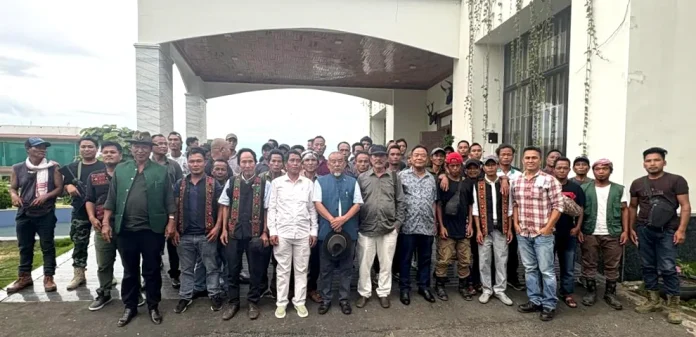Kohima, July 16: More than 80 national workers from the Kuki Region comprising both civil and military wings of the GPRN/NSCN, held a high-level interaction with senior Naga political leaders, including Ato Kilonser and Working Committee (WC), NNPGs Convener N. Kitovi Zhimomi and Vice President Chennyiem Konyak, at the Oking on Tuesday.
Led by senior Kuki leader C. Singson, the delegation pledged unwavering support for an “honourable and acceptable political solution” to the long-standing Indo-Naga peace process. The meeting, according to a statement issued by the Ministry of Information and Publicity (MIP) of GPRN/NSCN, underlined the enduring contributions of the indigenous Kukis to the Naga political movement and their commitment to continue playing a pivotal role in the ongoing journey for justice and recognition.
The GPRN/NSCN recalled the legacy of Lengjan Kuki, the only Kuki signatory to the historic January 10, 1929 memorandum submitted to the British Statutory Commission, calling him a “beacon of light” for present and future generations of indigenous Kukis in Nagaland.
“The contribution of Kukis to the Naga political movement from 1929 till date was remarkable for a fact that Kukis had stood shoulder to shoulder with the Naga pioneers in the political movement, much earlier than our own Naga brothers from Manipur and this fact of history cannot be erased,” the statement read.
The leadership also encouraged Kuki national workers to carry forward the legacy of the pioneers and urged the Kuki national workers to ignore the false scripts of those late entrants of the Naga movement who, they alleged, are attempting to distort and diminish the Naga history, identity, and culture.
During the meeting, the delegation expressed deep appreciation for the leadership of President Maj. (Retd.) R.M. Lotha and Convener N. Kitovi Zhimomi, pledging continued support and cooperation. They emphasised that the Kukis of Nagaland remain committed to defending and safeguarding the land, while supporting peaceful and inclusive resolutions to political challenges.
The statement concluded by calling for unity and continuity in preserving the integrity of the Naga movement and affirmed that indigenous Kukis will remain a vital part of both the political and social fabric of Nagaland.

